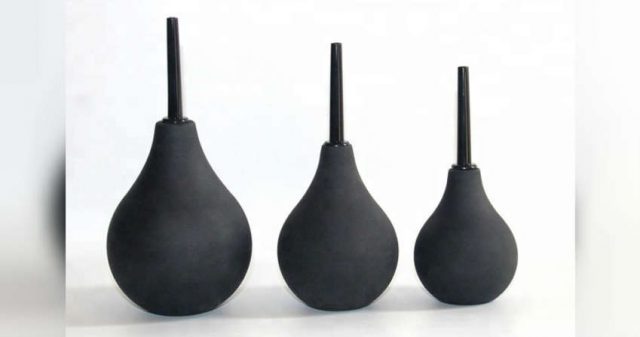
A new study links rectal douching with an increase in the risk of transmission of HIV and other STIS.
The overview study looked at multiple research papers published between 1970s and 2018.
Before engaging in receptive anal sex, many people practice rectal douching.
It involves flushing the rectum out with water to clear away any traces of fecal matter. It’s particularly common among gay and bi men who ‘bottom’ for others.
For example, one study found between 30%-52% of gay and bisexual men in the US report douching. This is usually done in anticipation of sex taking place.
However, the researchers say that the practice can wash away rectal mucus which protects the delicate lining of the rectum. Exposing this delicate lining to damage can increase the risk of HIV or STI transmission taking place.
It suggests the risk may be heightened for those using soapy liquid instead of just water, or ‘high-volume’ enemas which may cause trauma. However, they conceded more research would help explore the link in greater detail.
In total, the study, published by the British Medical Journal, looked at 24 smaller studies, which included a total of 20,000+ participants.
Researchers at the Sun Yat-Sen University in Shenzhen, China led the overview. They wanted to look specifically at gay and bi men as this group are at particular risk of STI infection and HIV.
The authors note PrEP medication is very effective at preventing HIV transmission. Furthermore, if someone with HIV has an undetectable viral load, they cannot transmit the virus. However, PrEP is not available everywhere and not everybody knows their HIV status. Hence the need for the research.
The researchers say another need for the study was to address some misbeliefs around douching.
Some men believe douching – before or after sex – may decrease the risk of acquiring an STI. However, according to this study, this is not the case.
In its conclusions, it says men who commonly douche generally report a higher incidence of HIV, as well as STIs including hepatitis B and hepatitis C, chlamydia, gonorrhea, syphilis and anal warts.
As well as potential damage caused by flushing out the rectum, improper use of douching tools can also cause damage to the rectum or anus.
However, the authors go on to discuss other potential contributory reasons for the link.
They say men who douche often report a higher number of sexual partners and are more likely to engage in group sex. However, based on their research, this alone fails to account for the higher incidence of STIs, which they conclude involves the actual practice of douching.
They call for more studies to determine the exact link between douching and STI transmission, looking in more detail into the liquids and volumes used. They also ‘urgently’ recommend men be warned that douching can carry risks.
Matthew Hodson, executive director of HIV information organization NAM, says men should not be too alarmed if they’re taking other steps to protect their health: ‘Any increased risk from douching is only significant if there is no other protection.
‘Douching won’t make PrEP any less effective or make transmission possible if the HIV-positive partner is undetectable. Condoms remain effective against transmission of HIV and other STIs, whether or not someone has douched.
‘If you can’t enjoy sex without douching, it may be even more important to ensure that you are protected against STIs. Using water only rather than something with detergent in it may strip away less of your natural protections.’
Dr Tom Nadarzynski, from the University of Westminster’s School of Social Sciences and Humanities, told GSN the study’s results did not surprise him. He suggested many factors at play.
‘Sharing of douching tools may increase susceptibility to STIs if that occurs during group sex when douching equipment is contaminated with blood or other bodily fluids.
‘Some liquids such as hot tap water or a large volume of enemas can cause injury to the sensitive rectal area. Douching can also damage the bacterial flora necessary for the healthy operation of the digestive system, leading to inflammation.’
Ian Howley, Chief Executive of LGBT HERO, also offered some douching advice.
‘It’s been suggested for a long time that constant douching can increase the risk of HIV and STI transmission as the mucus that the anal passage produces works to stop tears and cuts. Essentially, the mucus stops you from bleeding during anal sex.
‘When you take that lining away it will increase the chances of cuts and tears happening. These make it easier for HIV and STIs to be passed on.’
He advises against using shower attachments to douche, as the water pressure can cause trauma. Instead, opt for a simple douche bulb. Use plain water at body temperature.
‘We have always gave frank advice when it comes to anal sex and douching: shit happens. If you are going to have anal sex the chances of poo being involved is highly likely.
‘However, if you don’t like the idea of that then douching can help. But you have to do it right to limit the risk of STIs and HIV being transmitted.’
Syphilis: what is it and why should gay men be concerned?







